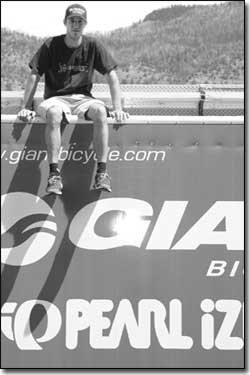 |
Mechanic
Tom Neb takes a break atop the Giant big rig
Tuesday afternoon
before preparing to settle in at the base of Durango
Mountain
Resort for the weekend races./Photo by Todd Newcomer.
|
When a rider from the
Giant mountain bike team races down the slopes of Durango
Mountain Resort this weekend, Durango local Tom Neb will
be at the bottom, wondering if he dialed in the bike's
suspension perfectly. Or he may be wondering if he picked
the right tires for the trail conditions.
Yet worrying will do him little good - until that racer
hits the bottom of the trail. If the rider makes it without
a mechanical problem, Neb will breathe a sigh of relief
and know that he's done his job. Then the roller coaster
of fretting will start all over again when another rider
takes to the trail.
For Neb, the worrying is usually short lived. Since
in mountain biking the mechanics aren't allowed on the
trails, wrenches like Neb just wait until the relatively
short race's end before springing to action.
It's a different sort of agony for road-bike mechanics,
who often are making repairs on the fly. But both kinds
of mechanics know this: For a professional biker to win
a race, mechanics can do little about what's on the bike,
but a whole lot about the bike itself. When everything
turns out OK - especially if the rider earns a spot on
the winner's podium - it makes the anxiety worth it,
Neb says.
In a sort of taken-for-granted position, mechanics often
feel as much, if not more, pressure than professional
riders do. They are the behind-the-scenes guys who work
long hours in varying conditions yet don't get much recognition.
One small error can result in one big loss. To rip off
one of the most famous professional riders in cycling: "Every
second counts."
"You can screw a rider or you can help them out," says
Craig Campbell, a bike mechanic at Hassle Free Sports. "There
isn't too much room for mistakes."
Campbell is a long-time local wrench (and former racer)
who once worked for the United States Cycling Federation,
and the Montgomery Avenir and Subaru Montgomery road
teams - stints he did in the 1980s and 1990s (and, notably,
in the early days of Lance Armstrong's career with the
Subaru Montgomery team). His tales of being a mechanic
for teams that competed internationally are exhausting
yet routine.
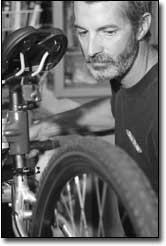 |
Bob Gregorio tunes a rear
derailleur Monday at the Durango
Cyclery./Photo by Todd Newcomer. |
While working for Subaru Montgomery, Campbell was one
of only two mechanics for a team of 12. That often meant
working from 5 a.m. to 10 p.m. when the team was competing
in multi-day stage races in Europe. Often, the mechanical
issues were mundane - tweaking this thing or that. Excitement
came when a rider flatted out on the course. Campbell,
riding behind in a team car, would jump out, grab a spare
wheel and switch it out. Getting the job done was essential - and
calculated: 30 seconds to switch a rear wheel; 20 second
to switch a front.
Anything more than that was teetering on turning the
rider into a loser.
"It could really be nerve-wracking," Campbell recalls.
Bob Gregorio agrees. Another local wrench, Gregorio
spent his early cycling years partly as a mountain bike
racer and partly as a mechanic for professionals. Gregorio,
like Campbell, is a self-taught bike wrench. The two
men spent their teen-age years tinkering with old-school
bikes - long before professional mechanic schools ever
existed.
"I got my education from the school of hard knocks," Gregorio
4 says. "Experience was the teacher."
Much of that came on the road, often in Europe, as Gregorio
worked for Team USA and later Team 7-11.
Gregorio had always hoped to end up working for a team
at the Tour de France - the ultimate race on the road
cycling scene. When he finally got there, it was thrilling,
but that feeling was short lived.
"By the time I got there, it was just a race," he says. "The
reality is, you have to bust your butt for long hours.
It's a thankless job. (Mechanics) aren't getting press
and it's the same duties day in and day out. It was a
lot less glamorous than I had envisioned."
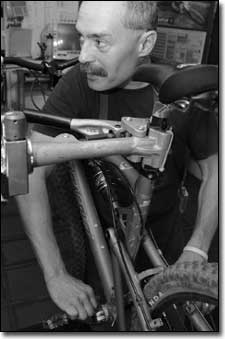 |
Craig Campbell of Hassle Free Sports
tightens a set
of cranks in the shop early this week./ Photo by
Todd Newcomer.
|
Campbell says the job forces people to adapt to changing
environments. Mechanics pretty much live a nomadic lifestyle,
going from race to race in town after town. It often
is too tiresome for people to do it for decades on end.
Yet these guys understand why mechanics endure it as
long as they can. Though unglamorous, bike wrenching
has great perks. Neb says that it's a constant education
hard to get elsewhere, since mechanics work for pros
who ride high-end bikes with top-of-the-line components.
"One of the best parts of doing it is staying current
on new bike parts and working with the latest technology," Neb
explains.
This is especially true since mountain biking evolved
so rapidly in the United States in the past two decades.
Materials and parts change quickly. Gregorio knows this
well, since his early passion in cycling was working
with classic American bikes. For him, the evolution is
what keeps him working on bikes, even if his time in
Europe didn't last long.
"Looking back, there were some exciting moments," he
adds.
Take, for instance, his first day on the job in Europe.
Moments after arriving, he was charged with picking up
a load of bike frames from team headquarters. At the
time, the team rode Merckx bicycles - designed by legendary
Belgian cyclist Eddy Merckx.
Just simply wanting to do the job right, Gregorio drove
to the factory and knocked on the door, expecting an
unknown soul. Instead, Merckx himself answered.
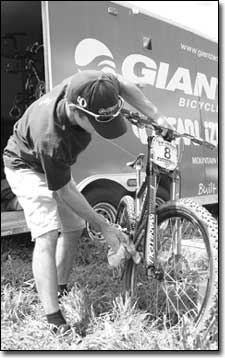 |
| Tom Neb cleans up a bike outside
the Giant trailer
Tuesday afternoon./ Photo by Todd Newcomer. |
"Little did I know, his residence was on the same property," Gregorio
explains. "I couldn't believe it. 4 It was exciting."
But the starstruck wrench ultimately left the road circuit
and ended up being personal mechanic for professional
mountain biker John Tomac. He felt he was better suited
for the job because he was tired of traveling and wanted
to spend more time at home in Durango.
Ultimately, he left the professional mechanic scene
altogether and returned to local shops to work. Campbell
did the same. Both men say that burnout is the unfortunate
ailment in the industry.
"I loved the job," says Gregorio. "But at the same time,
once you keep going back to the same venues, it just
loses something."
Burnout is what led Campbell to turn down a job from
team Motorola when he moved to Durango in 1994, which
was an effort he says, "to get away from it all."
Neb understands all of this. He's in the throes of traveling
nationally with team Giant. He says he certainly sees
where Campbell and Gregorio are coming from. Neb doesn't
let their experiences go unexamined. And it explains
why, as these three wrenches says, these days so few
mechanics remain on the professional circuit. Coupled
with low pay and a saturated racing environment, whether
road or mountain bike, mechanics come and go as often
as bike technology.
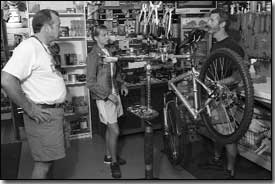 |
Bob Gregorio, right, of the Durango
Cyclery, tries on his retail hat as he shows a potential
buyer the ins
and outs of working the gear system./ Photo by Todd
Newcomer. |
Neb says he's unsure how much longer he'll do it. He
hopes to put in another year with Giant, then it may
be back to shop wrenching, which he's already done for
15 years.
"I still really like it enough to hang on," he admits. "But
I'll be interested to see how many mechanics are still
around when I go to (the NORBA) races this weekend. I
don't suspect I'll see many."
Campbell says mechanics have bikes in their blood. It's
not something easily shaken.
"In some ways, I wished I would have stayed with it.
It's a great life if you don't mind being a gypsy. I
miss it, and yet I don't."
|